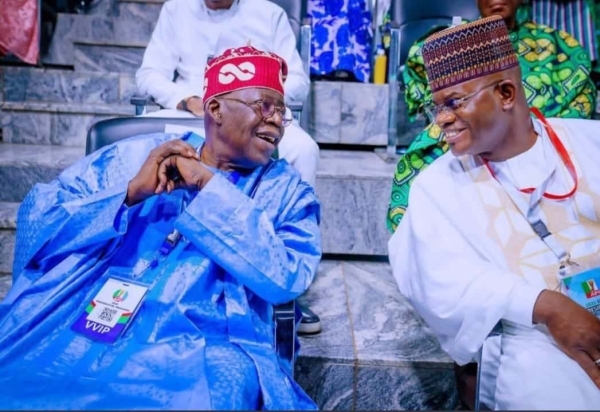The reason President Bola Ahmed Tinubu did not intervene to stop the Economic and Financial Crimes Commission (EFCC) from investigating former Kogi State Governor, Yahaya Bello has been revealed.
Bello, a chieftain of the All Progressives Congress (APC), was a member of the defunct Tinubu/Shettima campaign organization that worked for Tinubu’s election in 2023.
Despite claims from some that Bello was being targeted by the EFCC, the President has consistently emphasized that the commission must fulfill its legal mandate, while encouraging Nigerians to support its anti-corruption efforts.
A member of President Tinubu’s inner circle explained to Western Post that the President’s decision not to intervene stemmed from a desire to send a clear message that his administration would not tolerate corruption in public office, regardless of ethnic or political connections.
The EFCC, led by Ola Olukoyede, accused Bello of N110 billion fraud, after initially filing 19 charges against him, his nephew Ali Bello, Dauda Suliman, and Abdulsalam Hudu for alleged money laundering offenses totaling N80,246,470,088.88.
In updated charges dated September 25, the sum allegedly laundered increased to N110,446,470,89.00. Bello and his co-defendants were accused of purchasing 12 properties in Abuja with the laundered funds.
The defendants were also charged with criminal breach of trust over the same amount.
The EFCC declared Bello wanted, and the Nigerian Immigration Service placed him on a watchlist after attempts to arrest him and his repeated absence from court proceedings.
In September 2024, Bello’s Media Office claimed EFCC operatives attempted to arrest the former governor at the Kogi Government Lodge in Asokoro.
Following Bello’s visit to EFCC headquarters, his media director, Ohiare Michael, alleged the operatives were trying to forcefully arrest him.
Explaining why President Tinubu didn’t interfere, presidency sources said the President aimed to send a clear message to corrupt officials that such behavior would no longer be tolerated.
According to the sources, Tinubu is determined to break the pattern where political allies evade prosecution despite evidence of misusing public funds due to party affiliations.
“Tinubu’s decision to let the EFCC proceed with Bello’s prosecution demonstrates a shift towards a more unbiased approach to tackling corruption,” the source, who requested anonymity, told Western Post.
He added that the President won’t “allow selective prosecution of individuals based on political loyalties.”
“Tinubu did not intervene to stop the anti-graft agency from carrying out its duties, especially considering that Bello is a key member of the ruling All Progressives Congress because upon assuming office, he emphasized the importance of transparency, accountability, and the rule of law.
“By allowing the EFCC to operate without interference, the President is sending a clear message that his government will not condone corrupt practices, irrespective of political affiliations or status,” the source added.
Another presidency official said Tinubu’s administration is committed to fighting corruption at all levels of government.
“Tinubu’s desire to uphold the independence and integrity of critical institutions like the EFCC was why he didn’t interfere. Don’t forget that the EFCC chairman had also confirmed in one of his public engagements that the President had never interfered in their operations.
“This autonomy is crucial in strengthening public trust in the nation’s institutions. As an anti-corruption body, Tinubu recognises that the EFCC must be empowered to act independently. So, stopping or interfering in the arrest of Bello could cast doubts on the administration’s anti-corruption fight,” the source added.
“By allowing the EFCC to pursue its mandate, the President is reinforcing his commitment to ensuring that his longstanding belief in democratic principles is upheld, even when dealing with close political allies.
“By not intervening in Bello’s arrest, Tinubu reinforces the idea that political office should not be a shield from legal scrutiny. The EFCC’s action against Bello can be seen as part of Tinubu’s broader effort to demonstrate that elected officials and public officeholders must be held accountable for their actions,” the source added.


